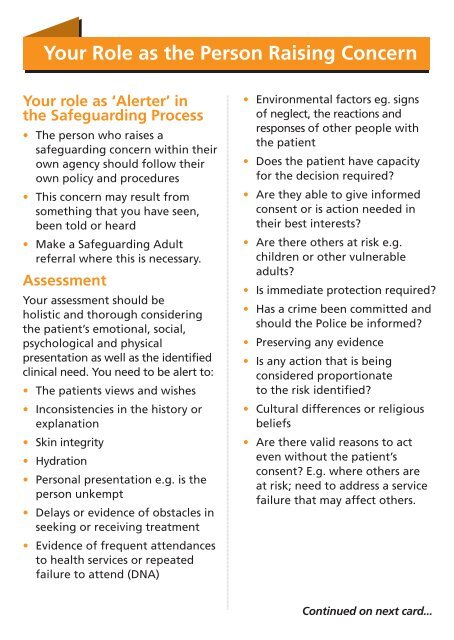Safeguarding Adults
Safeguarding-Adults-Pocket-Book-1
Safeguarding-Adults-Pocket-Book-1
You also want an ePaper? Increase the reach of your titles
YUMPU automatically turns print PDFs into web optimized ePapers that Google loves.
Your Role as the Person Raising Concern<br />
Your role as ‘Alerter’ in<br />
the <strong>Safeguarding</strong> Process<br />
• The person who raises a<br />
safeguarding concern within their<br />
own agency should follow their<br />
own policy and procedures<br />
• This concern may result from<br />
something that you have seen,<br />
been told or heard<br />
• Make a <strong>Safeguarding</strong> Adult<br />
referral where this is necessary.<br />
Assessment<br />
Your assessment should be<br />
holistic and thorough considering<br />
the patient’s emotional, social,<br />
psychological and physical<br />
presentation as well as the identified<br />
clinical need. You need to be alert to:<br />
• The patients views and wishes<br />
• Inconsistencies in the history or<br />
explanation<br />
• Skin integrity<br />
• Hydration<br />
• Personal presentation e.g. is the<br />
person unkempt<br />
• Delays or evidence of obstacles in<br />
seeking or receiving treatment<br />
• Evidence of frequent attendances<br />
to health services or repeated<br />
failure to attend (DNA)<br />
• Environmental factors eg. signs<br />
of neglect, the reactions and<br />
responses of other people with<br />
the patient<br />
• Does the patient have capacity<br />
for the decision required?<br />
• Are they able to give informed<br />
consent or is action needed in<br />
their best interests?<br />
• Are there others at risk e.g.<br />
children or other vulnerable<br />
adults?<br />
• Is immediate protection required?<br />
• Has a crime been committed and<br />
should the Police be informed?<br />
• Preserving any evidence<br />
• Is any action that is being<br />
considered proportionate<br />
to the risk identified?<br />
• Cultural differences or religious<br />
beliefs<br />
• Are there valid reasons to act<br />
even without the patient’s<br />
consent? E.g. where others are<br />
at risk; need to address a service<br />
failure that may affect others.<br />
Continued on next card...


